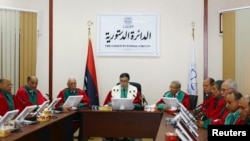Libya's Supreme Court ruled on Monday that parliament's election of Prime Minister Ahmed Maiteeq a month ago was unconstitutional, state media reported, a decision that means his predecessor will stay on for now, a parliament speaker said.
OPEC producer Libya's government and parliament are struggling to impose authority on a country awash with arms and militias who ousted former leader Moammar Gadhafi in 2011 but now defy state authority.
Maiteeq's appointment as head of Libya's interim government had followed a chaotic vote in parliament, which saw a walkout by secular lawmakers and an attack on the building by armed gunmen.
Parliament is divided between Islamists and more moderate forces as well as along tribal and regional lines.
Maiteeq won the first ballot with 123 votes and the second with 83.
Opponents insisted a quorum was not present either time. Some lawmakers and judicial experts disputed the outcome.
Outgoing Prime Minister Abdullah al-Thinni, a career army officer who resigned in April, had refused to hand over power to Maiteeq after some lawmakers questioned the validity of the vote and said he would wait for a court decision.
“The ruling stated... the appointment of Mr. Ahmed Maiteeq as premier of the interim government was unconstitutional,” television reported.
There was no immediate reaction from Maiteeq, who was elected by independent and Muslim Brother Islamists, but parliament's second deputy speaker Salah Makhzoum told reporters lawmakers would respect the ruling.
“From this moment... Abdullah Al-Thinni is the caretaker prime minister until Congress [parliament] learns the court's reasons for deciding that Maiteeq's election was unconstitutional,” he said.
A group of rebels occupying several oil ports in eastern Libya welcomed the ruling, according to a statement published on Monday.
The rebels had refused to deal with Maiteeq and the government is locked in a standoff with them over reopening of ports.
Libya has lost $30 billion due to 10 months of protests at oilfields and export terminals, the central bank said last week.
Refused to leave post
Thinni announced his resignation earlier this year after an armed attack on his family, according to a report by the French news agency AFP.
But he insisted that his successor should be chosen by a new parliament rather than its contested predecessor and refused to recognize Maiteeq's cabinet.
After refusing to hand over power, Thinni convened his cabinet last week even as Maiteeq's government held its first session, reportedly in a luxury hotel since his predecessor was at the time occupying the seat of government.
The political standoff between the rival cabinets amid rising unrest across the country allowed rogue general Khalifa Haftar to press an offensive against Islamists in the restive eastern city of Benghazi.
Maiteeq, 42, an independent backed by the Islamists, had been due to lead the country for a short interim period until June 25, when the country is due to hold an election to replace the congress, AFP reported.
Maiteeq's election took place at a second session of the General National Congress in early May, days after gunmen stormed the building to interrupt an earlier ballot.
Several liberal lawmakers accused Islamist blocs within the interim parliament of allowing late arrivals at the session to cast their votes after the initial result was announced to make up the 121 votes needed, after Maiteeq had garnered only 113 votes, according to AFP.
The court ruling would be examined by the administrative court later Monday, lawyers said. Parliament will discuss the matter further on Tuesday.
Some information for this report provided by AFP.
OPEC producer Libya's government and parliament are struggling to impose authority on a country awash with arms and militias who ousted former leader Moammar Gadhafi in 2011 but now defy state authority.
Maiteeq's appointment as head of Libya's interim government had followed a chaotic vote in parliament, which saw a walkout by secular lawmakers and an attack on the building by armed gunmen.
Parliament is divided between Islamists and more moderate forces as well as along tribal and regional lines.
Maiteeq won the first ballot with 123 votes and the second with 83.
Opponents insisted a quorum was not present either time. Some lawmakers and judicial experts disputed the outcome.
Outgoing Prime Minister Abdullah al-Thinni, a career army officer who resigned in April, had refused to hand over power to Maiteeq after some lawmakers questioned the validity of the vote and said he would wait for a court decision.
“The ruling stated... the appointment of Mr. Ahmed Maiteeq as premier of the interim government was unconstitutional,” television reported.
There was no immediate reaction from Maiteeq, who was elected by independent and Muslim Brother Islamists, but parliament's second deputy speaker Salah Makhzoum told reporters lawmakers would respect the ruling.
“From this moment... Abdullah Al-Thinni is the caretaker prime minister until Congress [parliament] learns the court's reasons for deciding that Maiteeq's election was unconstitutional,” he said.
A group of rebels occupying several oil ports in eastern Libya welcomed the ruling, according to a statement published on Monday.
The rebels had refused to deal with Maiteeq and the government is locked in a standoff with them over reopening of ports.
Libya has lost $30 billion due to 10 months of protests at oilfields and export terminals, the central bank said last week.
Refused to leave post
Thinni announced his resignation earlier this year after an armed attack on his family, according to a report by the French news agency AFP.
But he insisted that his successor should be chosen by a new parliament rather than its contested predecessor and refused to recognize Maiteeq's cabinet.
After refusing to hand over power, Thinni convened his cabinet last week even as Maiteeq's government held its first session, reportedly in a luxury hotel since his predecessor was at the time occupying the seat of government.
The political standoff between the rival cabinets amid rising unrest across the country allowed rogue general Khalifa Haftar to press an offensive against Islamists in the restive eastern city of Benghazi.
Maiteeq, 42, an independent backed by the Islamists, had been due to lead the country for a short interim period until June 25, when the country is due to hold an election to replace the congress, AFP reported.
Maiteeq's election took place at a second session of the General National Congress in early May, days after gunmen stormed the building to interrupt an earlier ballot.
Several liberal lawmakers accused Islamist blocs within the interim parliament of allowing late arrivals at the session to cast their votes after the initial result was announced to make up the 121 votes needed, after Maiteeq had garnered only 113 votes, according to AFP.
The court ruling would be examined by the administrative court later Monday, lawyers said. Parliament will discuss the matter further on Tuesday.
Some information for this report provided by AFP.






